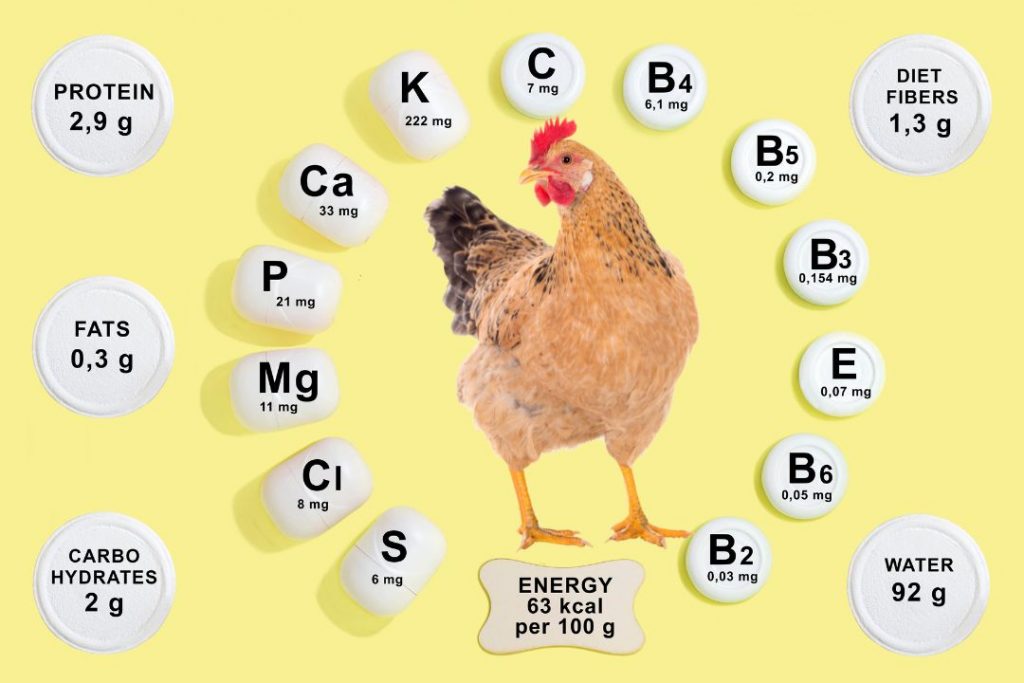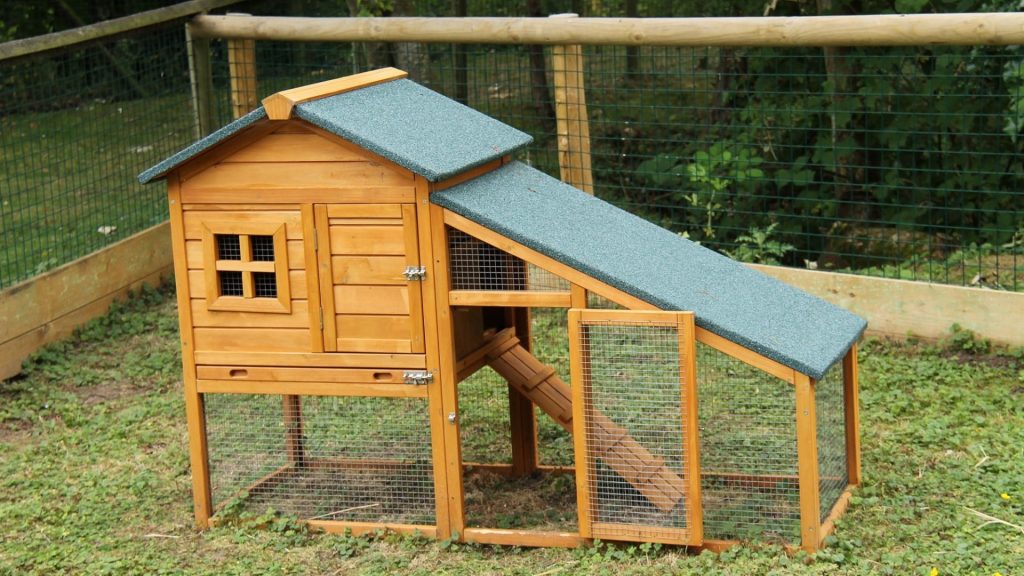Vitamins and minerals for chickens are extremely crucial for longer life, enhanced hatch rates, and improved eggshell quality. Moreover, sufficient vitamins supply to decrease the mortality rate, improved fibrous content, and increase thigh, breast, and body weight.
The necessary vitamins for your chickens are vitamins A, B, D, E & and K. The required mineral elements are Manganese, iron & copper, Lodine, magnesium, Sodium, Potassium, and Chloride, electrolyte, etc.
After conducting in-depth research in this article we disclosed all the details of vitamins and minerals for your birds. So, sharply read this guide till the end:
What Does A Chicken Require?
Chicken requires various minerals and vitamins to stay healthy. A healthier chicken can ensure peak performance and greater egg and meat production. The growing feathers or muscle, metabolic processes, good health, and egg and meat production all require the necessary vitamin supply.
Your chicken can get all the vitamins and minerals from the complete feed. Whether crumbled, pellet, or mashed, the feed includes all the necessary vitamins for your chickens. However, your flock may love eating the garden’s feed scraps, grains, insects, and bugs. But these do not include minerals and vitamins. So this normal food can’t ensure the essential supplement for your chicken’s good egg production and greater health.
Poultry mainly needs two types of minerals that are trace and macro. When the weight of your chicken becomes 100mg/kg, it requires Macro minerals. The main elements of Macro minerals are sodium, calcium, potassium, phosphorus, chloride, etc. Per day the calcium requirement of laying hens is 4g. For one eggshell, the birds require 2 g of calcium.
Phosphorus, calcium, and vitamin D are crucial for the birds’ shell integrity and structural integrity. The hens take phosphorous and calcium out of their bones in order to make the eggshells strong.
Essential Vitamins And Minerals For Poultry
Fat-soluble vitamins, water-soluble vitamins, and minerals are most essentials for your chicken. Fat-soluble vitamins contain vitamin A, vitamin D, vitamin E, and vitamin K. The main elements of water-soluble vitamins are Thiamine (B1), pantothenic acid, choline, folic acid, riboflavin (B2), vitamin B12, and biotin.
Minerals also contain several elements. Lack of any of these vitamins or minerals results in different problems in the body of your chicks.
|
Fat Soluble Vitamins |
Water Soluble Vitamins |
Minerals |
|||
|
Vitamins |
Results of Insufficient Vitamins |
Vitamins |
Results of Insufficient Vitamins |
Vitamins |
Results of Insufficient Vitamins |
|
Vitamin A |
Weakness, egg production reduction or lack of growth |
Thiamine (B1) |
Death & loss of appetite |
Magnesium |
Sudden death |
|
Vitamin D |
Reduced egg production, thin shelled eggs, rickets |
Pantothenic Acid |
Dermatitis on feet and mouth |
Calcium |
Poor hatchability, low quality egg shell, rickets |
|
Vitamin E |
Encephalomalacia, enlarged hocks |
Choline |
Fatty liver, poor growth, reduced egg production |
Phosphorous |
Poor quality hatchability, rickets |
|
Vitamin K |
Intramuscular bleeding, prolong blood clotting |
Riboflavin (B2) |
Poor growth, curly-toe paralysis, poor egg production |
Manganese |
Poor hatchability, Perosis |
|
Folic Acid |
Anaemia, poor growth, poor feathering |
Copper |
Anaemia |
||
|
Vitamin B12 |
Embryonic mortality, Anaemia |
Iron |
Anaemia |
||
|
Biotin |
Dermatitis around beak and eyes |
Zinc |
Short bones, poor feathering |
||
|
Lodine |
Goitre |
||||
|
Cobalt |
Mortality, slow growth, less hatchability |
||||
Do Chicken Require Vitamin Supplements?
Yes! For sufficient meat and egg production, your chicken requires enough protein, energy, and fiber. Whether you have free-range birds or keep your chicken in a coop, the birds require specific vitamins and minerals supplements.
The smart flock owner gives complete feed to their poultry. The commercially manufactured chicken feed contains every vitamin and mineral. However, the impact of complete feed on backyard chicken and commercial poultry flocks is not the same. Take a look at the following table to understand the point of difference:
|
Backyard Chickens |
Commercial Hens |
Considerations |
|
|
Living Conditions |
|
|
|
|
Lifespan |
|
|
|
|
Diet |
|
|
|
Can Insufficient Nutrition Cause Chicken Health Problems?
Yes! Insufficient nutrition supply creates different health issues in your chickens. Just by providing a balanced diet, you can avoid many health-related problems for your chickens. Your birds will not get the necessary vitamin supply due to minor variations in diet. Moreover, if your flock goes through any stress like molting, illness or extreme temperature, etc., the bird will stop getting vitamins.
A deficiency of one nutrient can prevent the chicken from utilizing other nutrients and getting other vitamins. Mineral and vitamin deficiencies greatly affect the health of your bird. Sometimes nutrition deficiencies lead to other health issues like coccidiosis and worms. However, due to mineral and vitamin deficiency, your chicken can suffer from the following problems:
- Poor egg-laying
- Ill- health
- Deformity
- Poor feather condition or feathering
- Lack of appetite
- Lethargy
- Weight loss
- Stunted growth
- Decreased immunity to illness, parasites, and disease
What Are the Essential Vitamins For Poultry?
For the perfect growth of your flock, you need to supply feed containing numerous vitamins. Some of the important categories of vitamins for your chicken are:
1. Poultry Vitamin A
The baby chicks require vitamin A for growth. On the contrary, vitamin A is important for maintaining the good health, hatchability, and egg production of adult birds.
Due to the deficiency of this vitamin, your poultry flock can suffer from colds, chronic respiratory disease, and other problems. Moreover, a lack of vitamin A can cause discharge from the eyelids and swelling of the face.
Also, you can see the round, white, yellowish, and cheesy patches around the pinhead size in the mouth and throat. However, common poultry diseases and viruses can cause the same symptoms among your flocks. Compared to normal poultry, turkeys require Vitamin A twice.
2. Poultry Vitamin B
There are several classifications of vitamin B., but our point of analysis is Thiamin or Vitamin B-1. Vitamin B deficiency affects the nerve system of your flock. And it affects the baby chicks more. Weight loss, weakness in the legs, jerky movements, and coordination of the legs and neck are some signs that your bird has vitamin B deficiency.
3. Poultry Vitamin D
Due to vitamin D deficiency, your flock can suffer from various problems. Some of the symptoms of a lack of Vitamin D are:
- Ruffled feathers
- Weak legs
- General unthrifty condition
- Soft and out-of-shape beak
Usually, between the 4th-11th weeks of brooding, you will see these symptoms among your bird’s flocks due to Vitamin D deficiency. Another name for vitamin D is the sunshine vitamin. This vitamin is extremely necessary to prevent the growth of chick’s rickets.
Without this element, your flock can suffer from egg paralysis or soft-shelled egg issues. While supplying Vitamin D to your birds, consider the mineral and calcium content. In this instance, the most appropriate step is consulting with your vets.
4. Poultry Vitamin E
For normal reproduction in hatching, one of the essential elements is vitamin E. If, from the time of hatching, your chicks suffer from vitamin E deficiency, it can cause the following:
- Imbalance health condition
- Loss of muscular control
Moreover, sometimes you can find your chicks lying on their sides due to vitamin E deficiency. Grow e-Seland is the most concentrated source of vitamin E. This vitamin greatly helps to increase hatchability.
What Minerals Do Chickens Need?
The necessary minerals for your chicken flock are the following:
1. Manganese For Poultry
In the diet of turkeys and immature chickens, manganese deficiency causes the following:
- Thin-shelled eggs
- Persis
- Poor hatchability
- Chondrodystrophy
- Persis
- Tibiometatarsal joint malformation and enlargement
- Distal end bending and twisting
- Shortening and thickening of the leg bones
The elevated intake of phosphorus or calcium will aggravate the condition due to the deficiency of manganese. The deficiency of manganese in the breeder’s diet can cause different troubles.
A lack of manganese reduces your flocks’ growth and feather development. Feed your flock a diet that contains at least 30-40 mg of Mn/Kg to reduce the effect of manganese deficiency.
2. Iron & Copper For Poultry
Your chicken flock will suffer from anemia due to iron and copper deficiency. Due to feeding the copper-deficient diet, the young chicks in their 2-4 weeks become lame. Without this mineral, your chicken’s bones easily break and become fragile. Moreover, the epiphyseal cartilage becomes shortened and thickened.
Sometimes the deficiency of copper can cause spastic and ataxia paralysis of your chicken. The lack of copper in a bird’s diet can cause aorta rupture. The biochemical lesion is also connected to the synthesized desmosine failure.
3. Electrolyte For Poultry
Electrolytes maintain the iconic balance and water in the body of your chicken. Therefore you can’t individually consider the potassium, sodium, and chlorine requirements. Rather, the overall balance of all these elements in your chicken’s body is important.
The overall balance of electrolytes is crucial. But the cases become more critical when the sulfur or chloride level becomes high.
4. Lodine For Poultry
From your chicken’s thyroid gland, significantly the thyroxin output declines due to the Lodine deficiency. As a result, the anterior pituitary of chicken produces and releases the thyroid-stimulating hormone in increased amounts.
Inhibition or lack of thyroid activity causes hens to become obsessed or cease laying. This also causes the abnormal growth of long and lacy feathers. Iodinated casein and thyroxin administration reverse the egg production effects. And it returns the eggshell quality to normal.
How much iodine your bird intake significantly affects the egg’s iodine content. When your flock suffers from an iodine-deficient diet, it greatly affects the eggs. The eggs will reduce their hatchability. Among the young birds, the thyroid enlarges because of the canola and rapeseed meal. With the normal feed, provide 0.5 mg of iodine to avoid iodine deficiency in your chicken flock.
5. Magnesium For Poultry
There is a lot of magnesium in natural feed ingredients. Therefore your flocks won’t suffer much from magnesium deficiency. If you only focus on giving magnesium to your newly hatched chicks, they will live only for a few days. Due to the huge magnesium supply, your chickens become lethargic, grow slowly, and often pant and gasp.
However, magnesium deficiency is also severe. Due to the lack of enough magnesium in feed, the mortality rate of birds becomes high. On the other hand, when the laying hens don’t get enough magnesium in their diet, their egg production declines. Also, the other symptoms are blood hypomagnesemia, decreased shell weight, and egg size.
In eggshell formation, magnesium plays a crucial role. Almost for every class of chickens, the magnesium requirement is 500-600 PPM MG. with the ingredients of natural feed usually, you can achieve this amount of magnesium.
6. Sodium, Potassium, & Chloride For Poultry
Maintaining the balance of electrolytes is important in your chicken’s body. This is often termed the acid-based balance or electrolyte balance. The effects of any element deficiency often result in severe consequences.
The chloride deficiency cause ataxia with the usual signals of nervousness. Often a sudden fright or noise can induce nervousness. The main signs of hypokalemia are muscle weakness, cardiac weakness, and poor intestinal tone.
Diet feed with a lack of enough potassium and protein can cause the slow growth of your birds. It not necessarily indicates potassium deficiency. The catabolized tissue release the potassium and nitrogen together.
Sodium deficiency lowers the acid-base balance and osmotic pressure in your chicken’s body. The other effects of sodium deficiency are:
- Hematocrit increases
- Decrease in blood pressure and cardiac output
- Decrease in subcutaneous tissues elasticity
- Impaired adrenal function.
Along with all these above, sodium deficiencies increase the acid levels in the blood uric. This increasing acid can cause the death or shock of your chicken.
Moreover, the severe or less growth of chicken can result in soft bones, retarded growth, cannibalism, and poor growth. The sodium depletion from your chicken’s body can result in several diseases like adrenal damage, urinary loss from renal and diarrhea, etc.
Frequently Asked Questions
What Are the Best Vitamins for Chicken?
Essential vitamins for your flock are Vitamin A, Vitamin B1, Vitamin D, Vitamin E, Vitamin K, etc.
How Do I Give Chickens More Vitamins?
Some elements full of minerals, vitamins, and protein are flax, pumpkin, and sunflower seeds. Give all these feeds to your chicken x, and these will meet the craving of your flock.
What Is the Most Important Nutrient for a Chicken?
Phosphorus, calcium, and salt are the most needed nutrient for your chicks. For the proper skeletal formation of your bird, calcium is most important. Also, calcium is essential for the laying hens in formatting the strong eggshell.
Should You Give Chickens Vitamins Every Day?
Daily, you should provide sufficient water-soluble vitamin supplies to your chicken to prevent the deficiency.
Final Thoughts
Hopefully, this comprehensive article has been helpful to you. And now you know what the necessary Vitamins and minerals for chickens are. Sufficient amount of vitamins in feed results in better feed conversion ratios and healthier and stronger chicken.
Moreover, your birds will produce an adequate amount of egg and meat. But lack of the vitamin can result in weakness, death, and other chicken diseases. So, for the flock owner, one of the most important jobs is ensuring a proper vitamin supply.
However, comment in the comment section if you have anything more to add to this discussion. We will appreciate your words.
Raising Chickens 101: A Beginner’s Guide
Get started in chicken raising with our expert-approved guide. From building a coop to hatching eggs, you’ll learn all the essential information you need to know. Topics include selecting breeds, caring for chicks, increasing egg production, and more. We also cover chicken feeds, behavior, disease prevention, and essential vitamins and minerals. Follow this guide for a successful and fulfilling experience.
Want to learn more about chicken raising? Check out our beginner’s guide below for even more tips and information:



